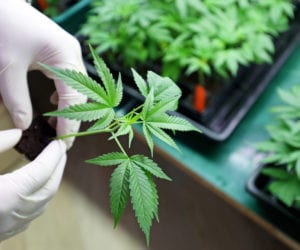Marijuana
 Marijuana is dried leaves derived from the cannabis or hemp plant for its THC properties. THC ( tetrahydrocannabinol) is the psychoactive chemical that users consume to experience physiological effects.
Marijuana is dried leaves derived from the cannabis or hemp plant for its THC properties. THC ( tetrahydrocannabinol) is the psychoactive chemical that users consume to experience physiological effects.
It is a Schedule 1 drug according to the DEA. Schedule 1 drugs have “no currently accepted medical use”. Some states, like California, do recognize medical uses of marijuana, but the federal government still keeps it on Schedule 1. In most states it is illegal to grow, sell or use the substance.
Marijuana induces a state of euphoria when consumed due to the psychoactive properties of THC. Ways to consume include smoking dried leaves, boiling the leaves in liquid to form a tea and consuming it within food.
Street names for marijuana include:
- Pot
- Weed
- Grass
- Herb
- Ganja
- Stinkweed
- Joint (when rolled in cigarette paper to smoke)
- Roach (the small end of a marijuana cigarette)
History and Trends
Smoked marijuana has been found in ancient ruins from the Bronze Age when burnt cannabis seeds were discovered in a ritual site in Romania. Cannabis was found in an Egyptian mummy area dating back to 950 B.C.
The drug was criminalized in the early 20th century in the United States and many countries around the world followed suit.
It has a long history because it is a plant and was commonly grown for other uses. The cannabis plant is a hemp plant. When grown for hemp, a strong, organic and resilient fiber, there is less than 1% THC. In contrast, marijuana grown for drug consumption consists of an average of 20% – 30% THC. Since hemp was criminalized along with marijuana and THC, hemp cannot be legally grown in most states.
Medical marijuana is a fairly new trend in the United States where THC is said to have medical benefits. It must be obtained by a doctor’s prescription.
Usage
Marijuana is commonly consumed by smoking or vaporizing. The user takes dried leaves and either rolls them in cigarette paper or puts the leaves in a pipe bowl. Then, either by heating or vaporizing, the smoke is inhaled. Other ways of consumption are making tea with the dried leaves or baking them in food such as “pot brownies”.
Effects
Marijuana effects everyone differently. The following short-term effects experienced occur in varying degrees:
- Euphoria
- Paranoia
- Anxiety
- Dry mouth
- Impaired motor skills
- Red eyes
- Altered sense of time and space
- Increased appetite
Long term effects of smoking marijuana include:
- Loss of IQ
- Loss of mental faculties
- Loss of motivation
- Impaired memory
Abuse & Addiction
It is commonly believed marijuana is not addictive. Studies have proven marijuana is addictive and can also act as a “gateway” drug. Research indicates about 1 in 11 users becomes addicted to marijuana when started as an adult; 1 in 6 if the user starts as a teen. Frequently, addicted marijuana users smoke every day, increasing the danger of contracting lung disease.
Addiction Withdrawal
Marijuana addiction can lead to withdrawal symptoms once the user stops. These symptoms include:
- Loss of appetite
- Chills
- Weight loss
- Insomnia
- Excessive sleeping
- Irritability
- Restlessness
- Nervousness
Treatment for Marijuana Addiction
Symptoms can be controlled and the person kept comfortable if marijuana withdrawal is done with the help of medical professionals. Marijuana addiction treatment involves medications and counseling to make the withdrawal process easier. Once detox and withdrawal have passed, counseling sessions are conducted to help the person stay sober and prevent a relapse. Medical professionals and counselors are qualified to assist in this process. Our rehabilitation facilities are equipped with qualified people to help our clients stay clean and sober and move forward to successful lives. Call us at 877-855-3470 for more information.